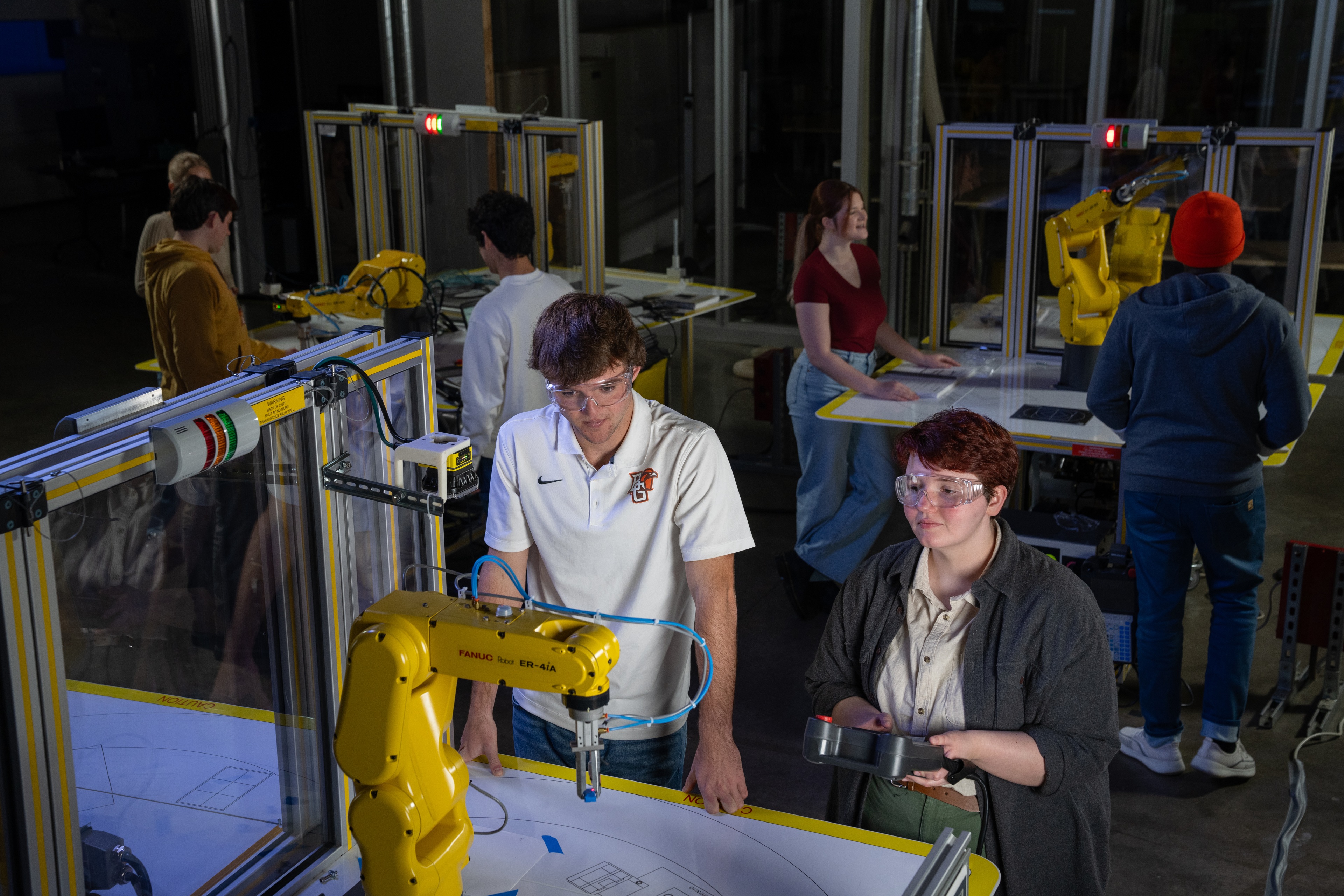Nationally recognized for student experience
The Wall Street Journal

Bachelor of Science in Engineering Technology (BST)
Engineering Technology
Are you interested in taking theoretical engineering ideas and translating them into actual products, manufacturing processes and solutions? Then the engineering technology program at BGSU is for you.
Engineering technology is more hands-on than other engineering degrees. It focuses on the application of engineering principles and requires less intensive science and math courses.
Our graduates design, build, and optimize mechanical systems and products. They are engineering leaders who manage people, technology, manufacturing and production resources.
You will gain a comprehensive understanding of engineering technology and skills in a variety of engineering areas – mechanical engineering, manufacturing, electronics and robotics. The flexible course of study allows you to build your own program by selecting the areas of engineering technology that suit your professional and career goals.
Why study engineering technology at BGSU in Ohio?
- Invaluable co-ops and hands-on learning. Bring engineering theory to life – and bolster your resume – with two paid co-ops with leading industry partners. Our students do meaningful work during these experiences. Many receive job offers from their co-op employers. You also can practice real-world skills through research, lab experiences and a senior design project.
- Quality classroom experiences. Our graduates are industry-ready, with the skills today's technologies demand. You will receive a foundation in engineering and the soft skills you need to communicate ideas in team environments.
- Active student organizations. We have many ways to get involved. You can continue learning, gain leadership experience and network by joining campus organizations like:
- Society of Automotive Engineers
- Society of Manufacturing Engineers
- American Society of Mechanical Engineers
- American Society for Quality
- International Society of Automation
- Institute of Electrical and Electronics Engineers
- Graduate options at BGSU. Continue your education in our Master of Technology Management program in engineering technology.
#1 public university in Ohio for career prep
The Wall Street Journal
Career – what can you do with an engineering technology degree?
The demand for engineering technology graduates with problem-solving skills, wide-ranging design experience, and the skills to work on multi-disciplinary teams has never been more robust in the aerospace, automotive, manufacturing and robotics industries.
Employers love BGSU engineering technology graduates because they’re ready to contribute from day one. The real-world experience you gain through co-ops and class projects gives you the technical skills the industry demands and the core communications and business skills you need to advance your career.
Career paths
- Mechanical engineer
- Process engineer
- Automation engineer
- Manufacturing engineer
- Engineering technologist
Quick Facts from the Bureau of Labor Statistics
Curriculum
The engineering technology bachelor’s degree program requires a minimum of 122 program hours:
- 2 full-time, semester-long cooperative education experiences
- 51 hours of engineering technology core courses
- 18 hours of technical electives
- 36 hours of BG Perspective (general education) courses
- Other required courses as needed
Courses will prepare you for professional success in various engineering technology industries. You will gain experience in specialized technical and engineering areas, as well as mathematics and science.
Our curriculum emphasizes hands-on experience in emerging technologies including:
- Additive manufacturing (3D printing)
- Engineering materials
- Mechatronics
- Manufacturing processes
- Electric circuits
- Industrial robotics and automation
- The foundation of lean manufacturing
You will learn to design, build and optimize mechanical systems and products in a wide range of industrial settings.
Co-ops and hands-on learning
Engineering technology is all about applying your knowledge in real-world settings. Our bachelor’s degree program offers:
- Laboratory classes
- Class projects
- Two semester-long, paid cooperative education work assignments (Many graduates land their first jobs with their co-op employers.)
- Senior design projects in which you solve real-world industry problems in a multi-disciplinary group setting
All these experiences build your resume and prepare you to hit the ground running on day one of your future career.
Our students have had co-op opportunities with more than 1,000 industry partners, including:
- Emerson Corporation
- Ford Motor Company
- Tenneco
- Dana Corporation
- Ventra Plastics
- Toyota Manufacturing North America, Inc.
- Whirlpool Corporation
- American Honda Motor Company
- Campbell Soup
- Stellantis - Jeep Division
- Marathon Oil Company
- Cooper Tire & Rubber
- General Electric
- Energizer Battery Company

Sample courses
- Computer-Aided Design
- Manufacturing Processes
- Industrial Robotics and Automation
- Solid Modeling
- Programmable Logic Controllers
- Sensors and Actuators
- Electric Circuits
- Engineering Materials
- Foundations of Lean
- Statics and Dynamics
- Thermodynamics and Heat Transfer
#1 university in Ohio – big or small, public or private – students would choose again
The Wall Street Journal
The engineering technology program is part of the School of Engineering in the BGSU College of Engineering and Innovation.
Accreditation
Bowling Green State University [BGSU] is accredited by the Higher Learning Commission. BGSU has been accredited by the Higher Learning Commission since 01/01/1916. The most recent reaffirmation of accreditation was received in 2022-2023, with our next reaffirmation of accreditation scheduled for 2032-2033. Questions should be directed to the Office of Institutional Effectiveness.
Request Information
Updated: 02/06/2026 04:18PM

